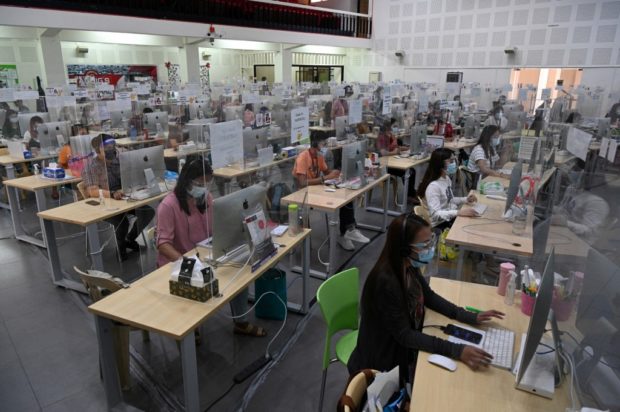
In this photo taken on March 3, 2021, registered teachers wearing face masks and shields conduct teleconferencing sessions to help struggling students as part of a local government-sanctioned online tutorial initiative in Taguig City. FILE PHOTO / AFP
MANILA, Philippines — The Philippine Association of State Universities and Colleges (PASUC) is seeking the provision of a P1,000 monthly allowance for teaching and non-teaching personnel of state colleges and universities in the country, saying that current subsidies provided to them are “grossly inadequate.”
During the briefing of the House committee on higher and technical education, PASUC president Dr. Tirso Ronquillo said that the P1,000 monthly allowance, similar to the monthly subsidy provided for teachers under the Department of Education (DepEd), should also be provided to the teaching and non-teaching personnel of SUCs.
“We propose an amount of at least 1,000 per month to cover necessary expenses during COVID-19 pandemic,” Ronquillo said.
“It is further requested that faculty serving under contract of service and job order personnel be likewise entitled in the proposed reimbursable expenditures, similarly to DepEd,” he added.
Ronquillo argued that the current P300 internet and mobile data expense reimbursement is not enough as the country shifts to distance learning amid the coronavirus pandemic.
“In view of the implementation of the flexible learning mode in lieu of face-to-face delivery, and the prevailing cost of mobile data, the monthly allowable reimbursable amount of P300 for the purpose is grossly inadequate,” Ronquillo said.
Ronquillo is referring to Department of Budget and Management Circular No. 2021-7, which provides for the reimbursement of internet and mobile data subscription expenses of government employees under the work from home arrangement.
The reimbursable amount shall not exceed P300, according to the circular.
Ronquillo, however, questioned the exclusion of those hired on a contract of service and job order basis in the circular.
“With the significant number of job orders and faculty members under contract of service, their contribution in ensuring the continuity of learning and of provision of services considering their exclusion in the reimbursement of internet and mobile subscription is highly inequitable and counter-productive,” Ronquillo said.